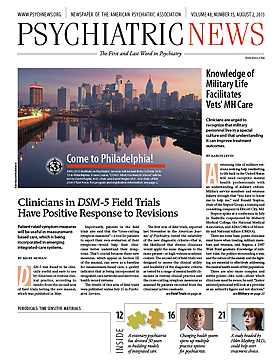Infections and autoimmune diseases may be risk factors for mood disorders, according to a study published in JAMA Psychiatry June 12.
The lead scientist was Michael Benros, M.D., Ph.D., of the National Center for Register-Based Research at Aarhus University in Copenhagen, Denmark.
Benros and his colleagues used Denmark’s national health registries to determine whether, in about 4 million individuals born from 1945 to 1995, hospitalization for an infection or an autoimmune disease increased the chances that a person would experience a subsequent mood disorder.
The subjects were classified as having a mood disorder if they had been hospitalized for such a disorder, had contacted a hospital emergency department because of a mood disorder, or had been diagnosed with a mood disorder by a psychiatrist in an outpatient practice.
The results confirmed the researchers’ hypothesis. Hospitalization for an infection increased the risk of later experiencing a mood disorder by 62 percent; hospitalization for an autoimmune disease increased the risk of later developing a mood disorder by 45 percent.
In addition, the number of infections and autoimmune diseases heightened the odds of having a subsequent mood disorder in a dose-response manner. And the risk of developing a mood disorder was greater shortly, rather than later, after hospitalization.
The results suggest that infections and autoimmune diseases might increase risk for or contribute to the development of mood disorders. Yet if there is such a relationship, what mechanism is at work? Perhaps inflammation is involved, the researchers suggested.
For example, “Systemic inflammation can induce a ‘sickness behavior,’ with symptoms of fatigue, reduced appetite, apathy, decreased social interaction, impaired concentration, and sleep disturbances. Many of these symptoms are similar to those of depression, and studies have suggested that in vulnerable individuals prolonged sickness behavior can progress to depression.” Also, “the increased inflammation that occurs in autoimmune diseases and infections may influence the brain through increased blood-central nervous system barrier permeability, making the brain vulnerable to infectious agents and immune components, such as cytokines and brain-reactive antibodies.”
Inflammatory processes have also been implicated in the negative and cognitive symptoms of schizophrenia, which overlap with the symptoms of mood disorders. And other studies indicate that peripheral blood biomarkers of inflammation appear to help indicate which individuals with a high risk of psychosis will convert to it (Psychiatric News, June 6). In addition, in a previous study, Benros and colleagues found that hospitalization for infections or autoimmune diseases increased the risk of subsequently developing schizophrenia. These results likewise suggest that inflammation provoked by infection or autoimmunity might play a causal role in schizophrenia.
“Interestingly, it is increasingly acknowledged that schizophrenia and mood disorders might share many risk factors,” Benros remarked during an interview with Psychiatric News.
And if infection, autoimmunity, and inflammation contribute to mood disorders and schizophrenia, could medications that counter infection, autoimmunity, or inflammation also be treatments for those two psychiatric disorders? There is some evidence to support that idea. For example, aspirin has shown some effect in people with schizophrenia and depression (Psychiatric News, July 2, 2010; September 21, 2012). Preliminary evidence from Japan, Israel, and the United States suggests that the antibiotic minocycline can counter negative and cognitive symptoms in schizophrenia subjects (Psychiatric News, August 17, 2012).
When asked whether their findings have clinical implications, Benros said, “At this point it is probably premature to treat patients with mood disorders differently based on a history of infections or autoimmune diseases. Nonetheless, if further research demonstrates a causal relationship between infections and mood disorders or between autoimmune diseases and mood disorders, then it might be appropriate to do so. Meanwhile, clinicians should pay attention to the co-occurrence of somatic diseases in patients with psychiatric disorders. Even if the relationship is not causal, treatment of the somatic diseases may improve the patients’ psychiatric symptoms and quality of life.”
Benros and his team are now conducting another study to see whether autoantibodies have an association with various psychiatric illnesses, especially mood disorders and schizophrenia.
The study was funded by the Stanley Medical Research Institute and the National Institute of Mental Health. ■
